Hey there! This post may contain affiliate links. As an Amazon Associate, I earn a teensy commission from qualifying purchases when you buy through these links (at no additional cost to you). For more info, please check the full disclaimer.
Is there a way to successfully prevent hair loss from diabetes without losing your beautiful hair permanently?
YES!
Dramatic hair loss is one of the early signs of diabetes in insulin-resistant women.
Let’s be honest – as women, we aren’t afraid to spend big bucks to keep the hair in the best shape.
Naturally, for us to see a fist full of hair strands in the shower is nothing short of a nightmare!
But it’s not all bad news.
In this blog, you’ll discover why diabetes causes hair loss in women. Plus, you’ll learn exactly how to prevent hair loss from diabetes.
Let’s first start with the reasons why high blood sugar leads to hair fall.
Quick Navigation
How Can Diabetes Cause Hair Loss in Women?
Diabetes is a disease that makes your body resistant to insulin action or production. Insulin is a hormone that absorbs excess glucose from our bloodstream.
Consistently high blood sugar level eventually leads to many health complications, including diabetes hair loss from damaged hair follicles.
A spike in your blood sugar levels will affect the blood vessels and limit fresh blood supply to your scalp. As a result, the hair strands won’t get enough nutrients and thus, start falling out.
In other words, both diabetes and hair loss go hand in hand.
But losing your hair is not the only indication of this disease.
Here are some other reasons why you might lose your lush hair besides hair loss from diabetes.
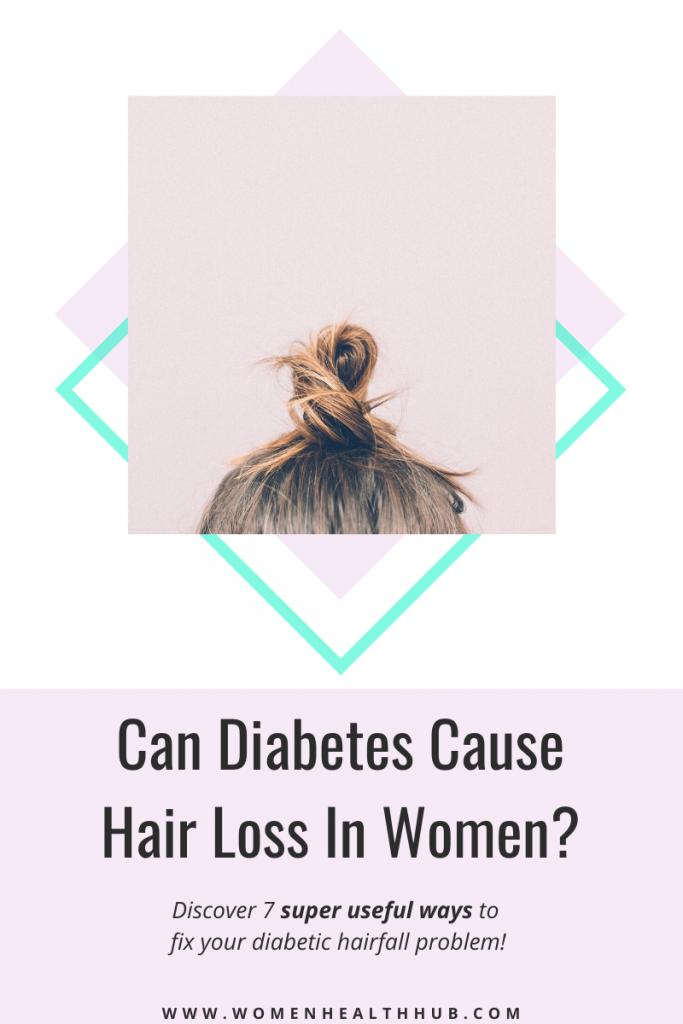
What are the Signs of Abnormal Hair Growth?
All humans have different types of hair follicles on the body. However, the hair growth in males and females is unique.
Following are the three main types of hair follicles found in women:
- Head & genitals: These hair cells produce coarse, dark and thick hair in a dense manner.
- Limbs: The follicles on arms or legs promote sparse growth of soft, light, and thin hair.
- Torso: This type facilitates short hair growth on the chest, abdomen, and back region.
We shed about 100 to 150 hairs every day, which is completely normal.
So don’t freak out over losing a few strands.
What you DO need to look out for is sudden dramatic hair loss — we’re talking a whole bunch of hair falling out for no apparent reason!
This usually leaves small bald spots or noticeable patches with little to no hair on the top of the head.
Diabetes hair loss is perhaps the most common reason behind abnormal or patchy hair growth in your body.
You may also observe visible thinning in the parting region. Many people may suffer hairless patches on other body parts too, such as legs, arms, and face, including eyelashes and eyebrows.
Bottomline, you might want to note how often and how much hair you’ve lost to determine whether it’s serious or not.
Only then you can figure out whether it has something to do with diabetes and hair loss.
Alopecia – The Hair Loss Disorder
If the hair loss is abnormally high, it’s possible you’ve developed a condition called alopecia areata.
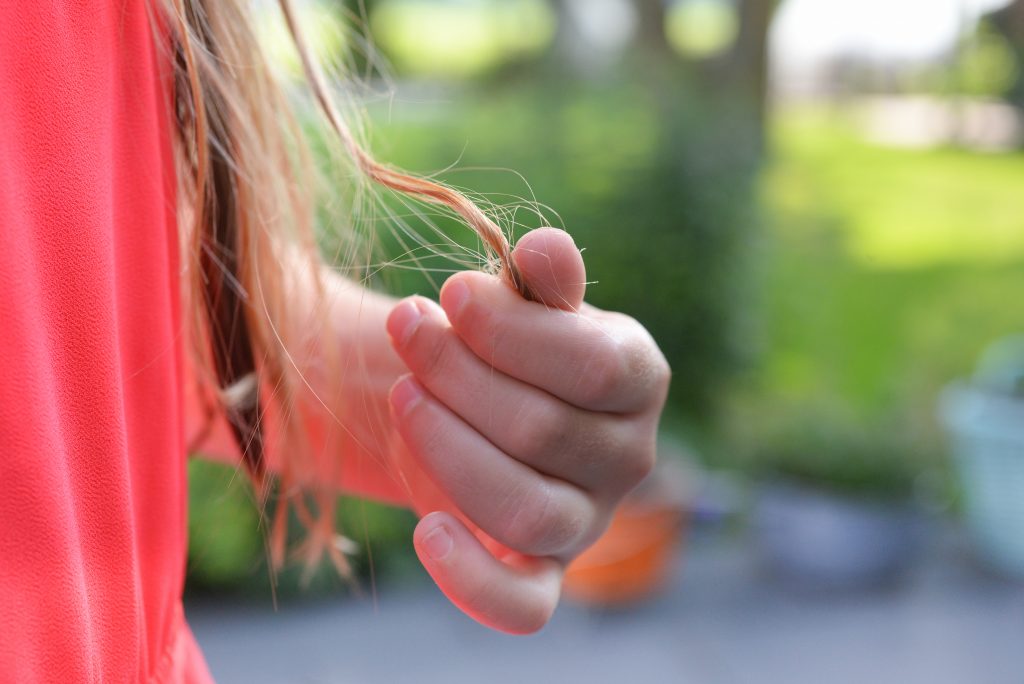
Alopecia is an autoimmune disease in which your immune system attacks the hair follicles. As a result, their usual growth cycle is affected.
This diabetes hair loss condition is quite common in women who are aged 45+ years.
Can the Type of Diabetes Affect Hair Loss?
Now that you know diabetes causes hair loss, you might be wondering…
Is there’s a relationship between the type of diabetes and the hair loss process?
Well, most studies show that alopecia affects type 1 diabetics only.
Just like alopecia, type 1 diabetes is an autoimmune blood glucose disorder. It causes your body’s immune system to attack the pancreatic cells responsible for producing insulin.
Therefore, it makes sense that type 1 diabetes leads to hair loss.
So what about type 2 diabetes?
Although there’s a shortage of data that links natural hair loss to diabetes type 2, I did come across an interesting article in JAMA Dermatology.
In this 2013 study, scientists discovered many deceased diabetic women aged <60 years with mild alopecia. However, this condition was more common and severe in 70+ years old women.
Which Regions Suffer Hair Loss From Diabetes?
As I mentioned before, hair loss from diabetes occurs in several body regions. Let’s take a look at each.
- Head:
Alopecia affects women by gradual hair thinning from the top and parting region of the head, instead of receding hairline (this happens in men).
The good news here is that women rarely go bald because of diabetic hair loss.
Here is an image showing how alopecia occurs in women.
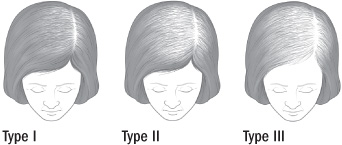
- Legs:
Consistently high blood sugar levels may cause a condition called diabetic neuropathy.
This condition causes damage to your nerves and usually affects feet and legs. As a result, you might feel numbness in your lower limbs.
You may also notice hair loss in legs in moderate to severe diabetic neuropathy cases.
- Arms:
Some diabetic women also experience loss of hair on arms but it’s usually more common in men.
- Face:
Additionally, you might notice facial hair loss from insulin resistance in eyebrows and eyelashes.
Is Diabetic Hair Loss Permanent?
Before we dive into how you can prevent diabetes hair loss permanently, you might be wondering if it’s even reversible.
Luckily, yes! You can easily reverse diabetes and hair loss from this disease if you’re careful.
Do keep in mind though that the process may be slow, depending on the reason why the hair fell out in the first place.
However, it’s also possible that diabetes hair loss is permanent.
In fact, the older you are, the more difficult it is for the hair to grow back.
But on the bright side, there are a few easy ways you can avoid hair loss from diabetes, right from the start!
I would suggest making a few changes to your dietary habits and lifestyle to control diabetes symptoms. This way, you can save yourself from irreversible hair damage.
7 Effortless Tips to Naturally Prevent Hair Loss from Diabetes
So how do you prevent hair loss from diabetes from permanently damaging your lush beautiful hairstyle? Let’s check out these 7 natural tips to stop diabetic hair fall.

1. Control your sugar intake
Consistently high blood glucose is the number one enemy of your hair.
Elevated sugar levels destroy your blood vessels and keep the nourishing agents from reaching the follicles. Thus, impairing their growth.
So if you want to reverse diabetes and hair loss problems, then start monitoring your sugar intake right away.
2. Reduce stress with proper planning
If you really want to know how to prevent hair loss from diabetes, the first thing you should do is create a diabetes self-management plan to get rid of pent up stress.
It goes without saying – one of the biggest reasons why women suffer hair loss from diabetes is stress.
Undoubtedly, living with diabetes is a huge pressure itself. You’ve to juggle too many things at once; diet, weight, medications, and check-ups, to name a few.
But worrying will only exacerbate the symptoms and create stress, leading to further health problems.
So with a diabetes management plan, you can slip many healthy lifestyle changes into your routine with ease.
Having a plan sets clear steps to manage diabetes without you constantly worrying about what to do next.
3. Begin a healthy self-care routine
Here’s another tip for you to prevent diabetes hair loss.
While preparing a diabetes self-management plan, I also recommend you to set specific self-care goals.
Self-care routines help you take charge of your emotional health and let out the negative feelings in a safe, restorative way.
Add any activities that boost your happiness and help you balance your emotional wellbeing. For instance, you could begin journaling and write down the daily struggles you go through while living with diabetes.
Looking for new therapeutic self-care routine ideas for this year? Check out my free printable self-care health goals checklist!
4. Avoid harsh chemical treatments
I remember this aunt of mine who made the mistake of listening to her “friend” and invested in $500 shampoos. Apparently, they were meant to fix the hair fall problem magically.
Um, yeah right!
Honestly, if you want to prevent hair loss from diabetes for good, the last thing you want to do is expose your hair to chemical-filled products.
These are the culprits that could potentially aggravate the hair loss process!
Steer away from serums, shampoos, and self-prescribed medications as they might cause adverse reactions with your diabetic medicines.
Which brings me to my next point — what can you do to regain your lost hair?
5. Seek professional help for hair regrowth
Most women go for laser therapy or medications prescribed by dermatologists to regrow the hair.
Some professionals recommend hair lotions and topical sprays. Others give vitamin supplements to grow back the lost hair.
You can also go for surgical options such as hair transplant or scalp surgery to initiate hair regrowth.
If the diabetic hair loss is permanent or beyond repair, no worries. You can always get a sleek wig and rock a totally new style!
6. Take nutrient-rich diet
Another way you can successfully avoid hair loss from diabetes is by paying attention to what you’re putting in your belly.
Shortage of essential nutrients in your body such as zinc, biotins, proteins, and even some vitamins can eventually lead to hair fall.
Make sure you’re getting enough natural foods including fruits, veggies, and grains to avoid deficiencies.
You can also visit your physician to get prescribed supplements, in case you notice any nutrient deficiency symptoms.
7. Exercise regularly
The best way to manage your blood sugar levels and prevent hair loss from diabetes is to exercise as much as you can.
This helps regulate glucose and shed off the extra fat that might be causing harm to your body.
Also, working up a daily sweat improves blood circulation process, necessary for your hair follicles to allow proper hair regrowth.
Don’t know where to start? No worries!
You can begin a daily morning beginner yoga routine which barely takes 3 minutes!
Also, my physical fitness health goals checklist includes beginner-level exercises that even busy moms can fit into the routine without any hassle.
(It’s free to download and print so don’t miss out!)
Hope you learned various ways on how to prevent hair loss from diabetes for good.
What are some tips you’d suggest to avoid permanent diabetic hair loss? Share with me in the comments below. 🙂
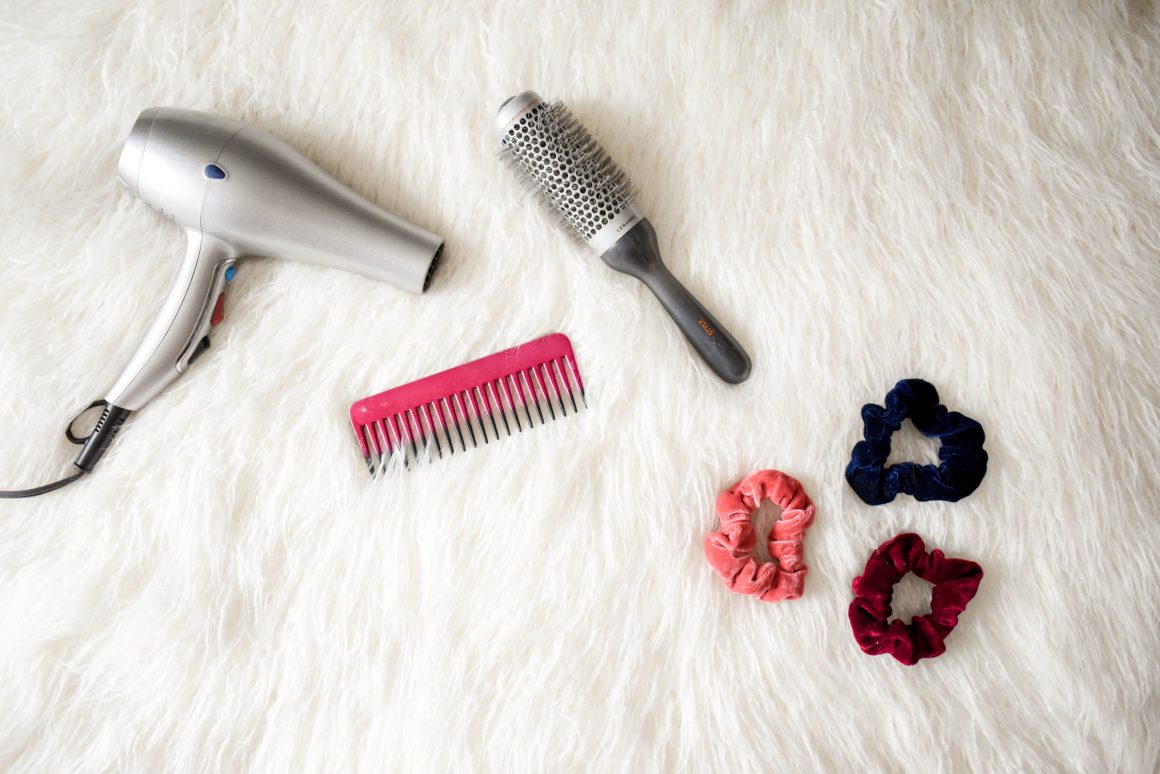







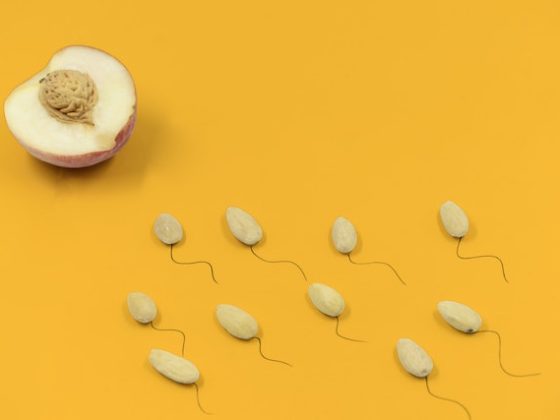
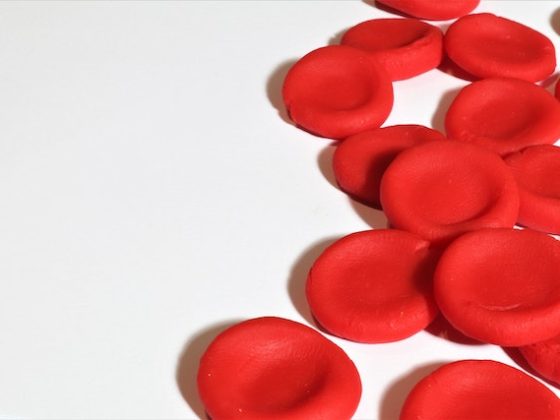

8 comments
This is very interesting information. I had no idea this happened. I am glad it is reversable. Thank you for raising awareness to this!
Thank you, Jody! Glad you liked it 🙂
There are no words to show my appreciation!
Thank you, so glad you found it helpful! 🙂
I have to thank you for the efforts youve put in writing this website. Im hoping to view the similar high-grade blog posts from you in the difficult as well. In truth, your creative writing abilities has annoyed me to acquire my own site now
This is very helpful. I am planning to ask my Endo-Doc about this later this week, when I see him the next time I have an appointment. I had no idea that my diabetes could be the culprit! I was thinking that it could be my grief because I am mourning my mother. I am glad to find out that I am not alone!!! Thanks for this information!
Sorry for your loss, JD. Diabetes can be so cruel and damaging. Your doctor will guide you best on what’s the ideal treatment to reverse diabetes hairloss. Glad you found this article helpful.
I’ve always had thick, wavy hair. Now it is not only falling out but feels like baby fine hair that is awful. My husband and mom passed away 2 years ago. I was my husband’s caregiver for 5 years. I was in a crazy high stress management job. Then I retired in May. I spend my days playing tennis, golf and walking. I lost 40 lbs. THEN I was diagnosed with Type 2. When I went on oral meds my hair started to fall out. I don’t get it. Yikes.